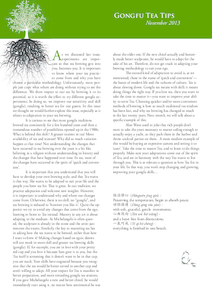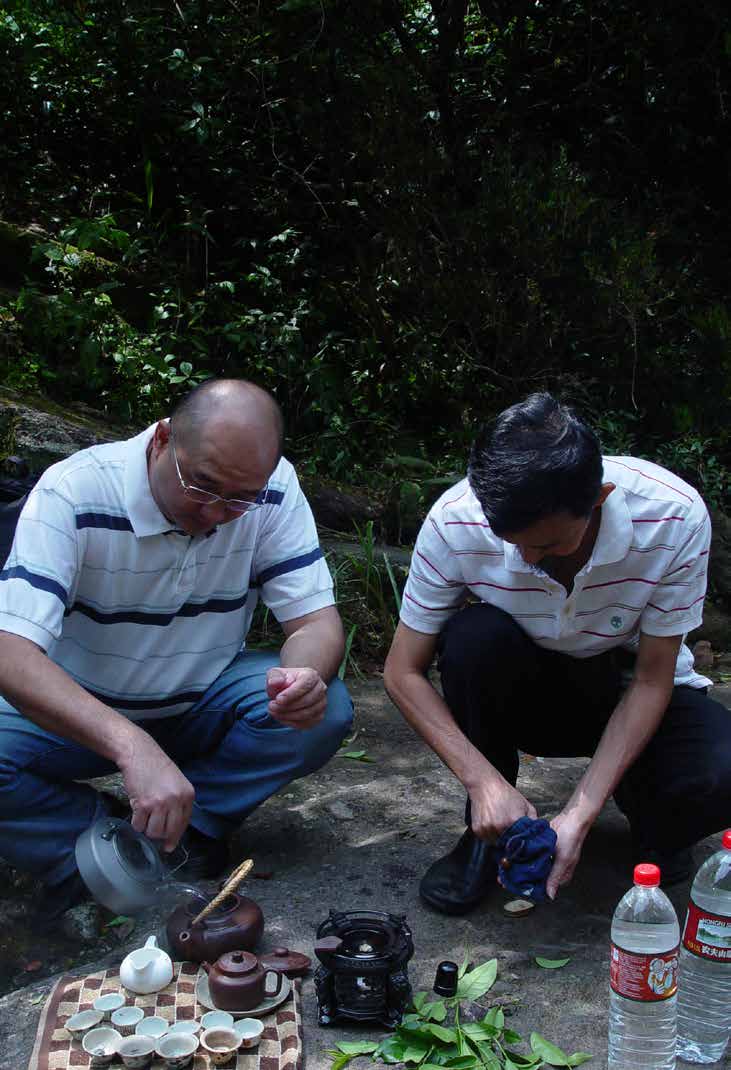
 |
|
As we discussed last issue, experiments are important so that tea brewing gets into you, becomes you. It is important to know where your tea practices come from and why you have chosen a particular methodology. Unfortunately, most people just copy what others are doing without trying to see the difference. We show respect to our tea by brewing it to its potential, so it is worth the effort to try different gongfu experiments. In doing so, we improve our sensitivity and skill (gongfu), resulting in better tea for our guests. In this issue we thought we would further explore this issue, especially as it relates to adaptation in your tea brewing.
It is curious to see that most gongfu traditions brewed tea consistently for a few hundred years and then a tremendous number of possibilities opened up in the 1980s. What is behind this shift? A greater interest in tea? More availability of tea and teaware? Why did so much variation happen at that time? Not understanding the changes that have occurred in tea brewing over the years is a bit like believing in a religion without understanding its history and the changes that have happened over time. In tea, most of the changes have occurred in the spirit of 'quick and convenient'.

It is important that you understand that you will have to develop your own brewing style, and that Tea wants it that way. She wants to be adapted to suit your life and the people you brew tea for. That is great. In our tradition, we practice adaptation and welcome new insights. However, it is important to understand why and where our changes come from. Otherwise, there is no skill, no "gongfu", and tea brewing is reduced to 'however you like it'. Quite the opposite: we try to avoid any changes that come from the ego, learning to listen to Tea instead. Mastery in any art is about adapting to the medium. As Michelangelo is often quoted, the sculpture is already in the stone and the artist just removes the excess. Similarly, the key to mastering tea lies in asking how the tea wants to be brewed, rather than how I want to brew it! Making changes based on egoic desires will not result in more skill and greater tea brewing skills (gongfu). If, for example, you are in love with your pretty red cup and you love it because Sam gave it to you, but the Tea itself is screaming that it doesn't want to be in that cup, you are stuck. Your skills have stagnated because you recognize that the tea would be better served in another cup and aren't willing to adapt. All your respect for Tea is manifest in better preparation, and more rewarding gongfu tea sessions. If you gave Michelangelo a new and better chisel, he would immediately start using it, no matter how sentimental he was November 2013 about the older one. If the new chisel actually and honestly made better sculptures, he would have to adapt for the sake of his art. Therefore, do not get stuck in adapting your brewing methodology to suit your ego.
The second kind of adaptation to avoid is, as we mentioned, those in the name of 'quick and convenient' - the banes of modern life and the vultures of culture. Tea is about slowing down. Gongfu tea means with skill; it means doing things the right way. If you love tea, then you want to take the time to master it - you want to improve your ability to serve Tea. Choosing quicker and/or more convenient methods of brewing is how so much traditional tea wisdom has been lost, and why tea brewing has changed so much in the last twenty years. Next month, we will talk about a specific example of this.
Alan Watts used to joke that rich people don't want to take the years necessary to master sailing enough to actually enjoy a yacht, so they park them in the harbor and throw cocktail parties on them. A more modern example of this would be buying an expensive camera and setting it to 'auto'. Take the time to master Tea, and to learn to do things properly. Make sure your adaptations come out of the spirit of Tea, and are in harmony with the way Tea wants to live through you. This is as relevant a question as how Tea fits in your life. In that way, you won't stop changing and growing, improving your gongfu skills...
恒温静沁 (Héngwēn jìng qìn) - Preserving the temperature, begin to absorb peace; 动轻揉運 (Dòng qīng róu yùn) - with soft, graceful, gentle movements; 心無別向 (Xīn wú bié xiàng) - and a heart free from distractions; 一氣呵成 (Yī qì hē chéng) - everything is finished in one breath.
